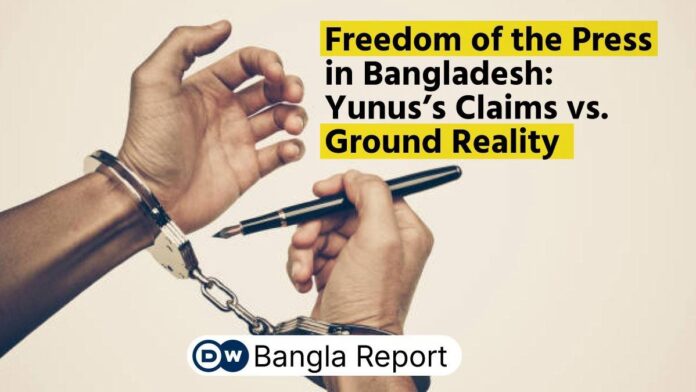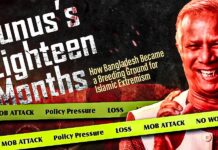On August 8, 2024, two days after the fall of Sheikh Hasina’s government in a mass uprising, Nobel laureate Dr. Muhammad Yunus became the Chief Adviser of Bangladesh’s interim government.
Since then, at least 266 journalists have been named in cases of murder or attempted murder.
Of them, 13 are currently in jail.
Despite serious concerns over the credibility of these cases, there has been no visible progress in investigations or judicial proceedings.
✪ What International & National Reports Say:
Recent reports by multiple international organizations have addressed the deteriorating conditions for the press in Bangladesh. But the most scathing critique came from within the country, during a meeting of the Editors’ Council on May 4, marking World Press Freedom Day.
Mahfuz Anam, President of the Editors’ Council and Editor of The Daily Star, stated:
“There are 266 journalists currently facing murder or violence-related charges. How is that even possible? This is a disgrace.
We are not saying that none of them committed any wrongdoing. If anyone truly did, investigate properly, try them, and punish them.
But six or seven months have passed, and there has been zero movement in the investigation.
The Law Adviser says: ‘We can’t interfere. People have the right to file cases.’
Fine — people can file cases. But if the law is being abused, does the government have no responsibility to stop that?
These journalists are living in fear — fear of mob violence. This is not acceptable.”
✪ Yunus’s Statement at Chatham House, London
At the event held by the Royal Institute of International Affairs on Wednesday, the moderator asked Yunus about widespread reports of repression of the press.
Yunus replied:
“That is not true. The media has never been this free. They are able to say whatever they want.”
✪ “Let Us Speak, Let Us Write” — Counter-Narratives from Dhaka
Barely a month ago in Dhaka, at the same World Press Freedom Day event, the ground reality painted a vastly different picture.
Matiur Rahman Chowdhury, Editor-in-Chief of Manabzamin, highlighted a recent incident:
“Three journalists lost their jobs after asking questions at a press conference held by the Cultural Adviser.
And yet, we’re celebrating Press Freedom Day? Who do we hold responsible — the government? The journalists’ union? The Editors’ Council?
I believe we all have failed.
There can be no democracy without a free press.
We must be allowed to speak, to write, and to question — only then can we have true press freedom.”
✪ Fear Culture and Mob Threats
Akhtar Hossain, General Secretary of a faction of the Dhaka Journalists’ Union, told Deutsche Welle:
“A culture of fear has been created — especially mob violence.
If someone writes something critical, groups form mobs to harass them.
Earlier, journalists would get calls from the DGFI. Now, it’s the mob. The repression continues, just in a new form.
The government wants to keep journalists fearful — and they’ve succeeded.
Press credentials are being revoked.
Journalists are being removed from press clubs and fired from their jobs just for writing against the government.
Even asking a question at a press conference can cost someone their job.”
✪ Journalists in Jail: Personal Toll & Family Trauma
Among the 13 jailed journalists are:
• Shyamal Dutta – Former General Secretary of the National Press Club, Editor of Bhorer Kagoj
• Mozammel Hossain Babu – Former CEO, Ekattor TV
• Shakil Ahmed & Farzana Rupa – Former senior journalists at Ekattor TV
DW spoke with several of their family members.
➤ Mozammel Babu’s Condition:
• Diagnosed with prostate cancer just before his arrest
• Underwent surgery, was due for follow-up cancer screening in November 2024, which never happened
• Still at risk of cancer relapse
• Also suffers from diabetes
“We no longer apply for bail,” said a family member.
“Every time we do, a new murder case is filed. Last April, the court implicated him in yet another murder case in Jatrabari. There’s no end to this.”
➤ Shyamal Dutta’s Health:
• Suffers from sleep apnea, which puts him at risk of heart disease, stroke, and cognitive decline
• Also diabetic and has high blood pressure and cholesterol
• Government has frozen all family bank accounts, pushing the family into financial hardship
“We’re borrowing from relatives to survive,” a family member said.
“His children are experiencing trauma. They’re afraid to even leave the house — they fear mob attacks.”
➤ Shakil Ahmed & Farzana Rupa’s Daughter:
• Missed her A2-level exams last month
• The family had to move due to doxxing and threats on social media
• Farzana Rupa was kept in a condemned cell for a month with dangerous criminals
“She’s broken, mentally and emotionally,” said a family member.
“She’s scared for her daughter’s safety.”
Yesterday, June 11, Farzana Rupa was briefly released on parole to see her deceased mother’s body.
Her tearful moment at the funeral has reignited public discourse on the issue.
✪ Legal Perspective
Veteran lawyer Z.I. Khan Panna, who is representing both Shyamal Dutta and Mozammel Babu, told DW:
“Each case requires a separate bail application.
The court has issued rules. Now let’s see how the government responds.
But the cases aren’t being investigated — and they’re still being held.
If police file charge sheets accusing these journalists of murder, I wouldn’t be surprised.
The police aren’t independent.
They’re still operating under colonial-era laws, which governments exploit to suppress dissent.
What the government says publicly and how its prosecutors behave in court are completely contradictory.”
✪ Government Response
So what is the government’s position on these cases?
Foyez Ahmed, Senior Assistant Press Secretary in the Chief Adviser’s Office, told DW:
1. “None of these cases were filed by the government.
Families of those killed in the July uprising filed the murder cases.”
2. “The government cannot influence bail decisions — the judiciary is independent.”
3. “The Information Ministry is reviewing the cases and has already discussed them with the Law Ministry.
Instructions may be issued soon.”
✪ Judiciary Under Pressure
Barrister Jyotirmoy Barua, a Supreme Court lawyer, revealed troubling patterns:
“Lower courts are denying bail.
Even when the High Court grants bail, prisoners are held for five to seven extra days.
Judges are being sent on forced leave without due process.
Some are under direct or indirect pressure.”
He cited the case of a journalist working for Samakal who had five false cases against him.
After securing bail in all five, the jail refused to release him — claiming more cases were on the way.
Eventually, five more false cases were filed.
“We once talked about political repression.
Now journalists face the same fate.
If five cases turn into ten for speaking the truth, what do we call that?
How do we stop this?
We can’t even openly discuss the rot within the justice system.”
“The Awami League used to threaten: ‘Let the law take its own course.’
But what we’re seeing today goes far beyond that.
How will the rule of law ever be restored?”





